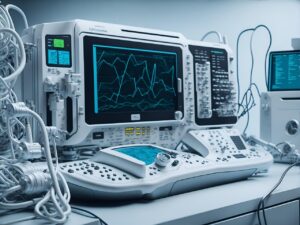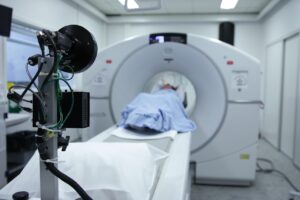HOW TECHNOLOGY IS IMPORTANT IN A HEALTHCARE CAREER
Healthcare technology is transforming the world of hospitals and patient care. In today’s rapidly changing world, everything is becoming increasingly advanced, and hospitals are no exception. The same technology that turned the world into a global village is now revolutionizing medical systems.
From making treatment easier to improving the lives of both patients and healthcare professionals, healthcare technology is at the heart of modern medical progress. Want to know how? Let’s explore the top advancements it brings to hospitals.
Non-Invasive Diagnosis
Before the advent of technology, doctors diagnosed patients’ diseases based on judgment, experience, or available medical tests, which was a painful process for the patients. However, technology has introduced non-invasive methods such as CT scans, MRI, Ultrasound, X-rays, and PET scans, which make diagnosis easier and quicker without harming the patient.
In this way, the doctor can make an accurate diagnosis and provide the proper treatment, which is only possible with the aid of technology. These technologies detect early disease and show results quickly on the screen.
Doctors also use computer software to review test results and adjust the patient’s treatment plan. In this way, these technologies enable doctors to select the most suitable treatment plan for each patient based on their diagnosis. These technologies, such as CT-scan and ultrasound, are also used to guide biopsy procedures. In this way, technology is not used for just one purpose; it serves multiple purposes.

healthcare technology
Electronic Health Records (EHRS)
Before the advent of technology, doctors maintained large and bulky paper files to record patients’ details, including their names, contact numbers, diagnoses, treatments, and discharges. These cumbersome and large files make it difficult for doctors and staff members, as they occupy space and are often collected in several bundles.
Therefore, it is challenging to locate a specific patient record among the bundles of bulky files. Then, technology introduces the software to store data in a digital format, such as Electronic Health Records. Now, the doctors use EHRS to store data in a digital form.
In EHRs, these records are easily accessible and can be shared from one location to another. The benefit of EHRS is that it reduces human error and allows for the easy retrieval of patient details in just a minute or second. It makes it easy to share and store data, and no worry of writing details on a large paper file.
Telemedicine
When there is no technology, it is difficult for patients and doctors to connect over long distances. There was difficulty for those patients who could not walk, were seriously ill, or were diseased.
Then, one of the family members of those patients went to the doctor and reported the problem. The doctor then came to check the patient and provided treatment. However, the issue was that some medical facilities, such as tests, were not available at the patient’s home. So, accurate diagnosis was difficult in those situations.
Telemedicine is a way of online communication between patients and doctors for illness and treatment, even when they are far away. Telemedicine is made possible by using apps, online platforms, and video calls, enabling patients to receive medical advice from doctors without needing to visit the hospital.
Telemedicine gained popularity during the COVID-19 pandemic and continues to assist patients who are far away and cannot visit the hospital.
healthcare technology
Medical Research:
Technology is a powerful tool in medical research. It plays a vital role in research. Scientists use computers and software to study disease, test new medicines, and invent new treatments for patients, such as cancer therapy, e.g.
Chemotherapy and radiotherapy. It also helps scientists to analyse results faster than ever. When technology is unavailable, it is challenging for scientists, as they must analyze results and detect diseases using books and relying on judgment and experience.
With the help of technology, scientists can not only detect diseases but also provide their treatment. A notable example is COVID-19, in which scientists not only detected the virus but also developed a vaccine for it.
As we know, there is no proper treatment available for COVID-19; however, scientists have made their best and most effective efforts to mitigate the pandemic and control the disease.
Education:
Technology not only benefits scientists and hospitals, but it also aids students and healthcare professionals in their educational pursuits. Technology makes learning easier for students through online courses, virtual training, and 3d models of the human body.
Technology also helps students and healthcare professionals stay updated with new advancements and the latest knowledge and skills. It provides opportunities to learn easily and practically, as it is not possible to study 3D models and anatomy without technology. So, technology also makes life easier and more advanced for studying.
Smart Medical Devices:
Devices such as smartwatches, digital thermometers, blood pressure monitors, glucose monitors, ECG watches, and fitness bands are now standard in both hospitals and at home. These devices help patients monitor their health and send regular updates to their doctor.
These devices should be in every person’s home because the world has changed and is digitized. We should also consider acquiring and using these essential devices at home, known as First Aid kits.
We also know how to operate or use these devices at home, as every person should know how to use them in emergencies. Additionally, we are aware that these devices, such as glucose meters, ECG watches, and blood pressure apparatus, are used in situations involving chronic conditions like diabetes or heart disease.
Robotics and AI in Surgery:
AI and robots are utilized in hospitals to facilitate surgery and enable doctors to work in a comfortable and stress-free environment. Artificial Intelligence is used to analyse lab results, detect disease outcomes, suggest treatment options, and detect cancer cells in scans.
At the same time, Robots are used in performing surgeries, disinfecting hospital rooms, delivering medicines, and helping patients with mobility. Robots also reduce risks and recovery time. But remember that they are not doctors; they only act as valuable helpers.
No one takes into account the human aspect, passion, and strength. These are only technological advancements in the hospitals that meet the hospital’s needs. However, there is also a need for humans because, without human commands, AI and Robots do nothing; these are inventions of humans.
healthcare technology

Benefits Of Technology In Healthcare:
It improved patient care by enabling healthcare professionals to access patients’ records of their medical history and personalized care. Technology enhances efficiency by utilizing tools and software, such as PACS or EHRS, to store and share data easily, thereby increasing productivity.
Technology helps reduce errors, facilitate accurate diagnoses, and share results quickly, enabling the development of an effective treatment plan. In this way, doctors can make easy decisions without wasting any time. Technology helps patients and doctors to communicate with each other even if they are far away.
This is possible only through telemedicine, which enables both patients and doctors to communicate easily via video calls and apps, and allows doctors to prescribe medication to patients remotely.
Analytics and data science help healthcare professionals make informed decisions and implement changes in patient treatment easily and quickly within their records. In this way, technology increases patient outcomes. Technology reduces the need to repeat tests, thereby helping both patients and hospitals by lowering costs and time.
It makes life easier for not only the doctor and patient, but also for a normal person who is ill and now checks their fever using a digital thermometer, or those with heart disease or blood pressure issues, who can now check their blood pressure using a digital BP apparatus.
These technologies are not difficult to operate, but they are easy for even a novice to use and understand because they are intuitive and accessible to everyone, not just healthcare professionals.
It enhances patient safety and care by utilizing these tools, making their lives easier through advancements in diagnosis and treatment, as it introduces AI and Robots to assist patients and doctors.
healthcare technology
Jobs In Healthcare Technology:
As we know, technology has transformed our lives and revolutionized hospitals through the use of advanced technological equipment. So, the medical industry is flourishing and growing day by day by using technology, and you don’t need to worry about technology taking the place of humans.
No, it is not correct because technological advancements are also the result of human invention, and they require human commands to operate; however, the final decision is also made by humans.
Therefore, there is always a need for humans in the medical field, but careers in healthcare technology are also amazing, interesting, and evolving. Here is a list of jobs that you can do in healthcare technology to serve humanity:
Health informatics specialist:
Design and implement healthcare technology systems.
Healthcare IT Project Manager:
Sees healthcare technology projects.
Clinical System Analyst :
Analyse and optimise healthcare technology systems.
Healthcare Data Analyst:
Analyze patient data to inform medical decisions.
Health IT Support Specialist:
Provides technical support to the healthcare support system.
Telemedicine Coordinator:
Take control of patient and doctor communication, such as facilitating patient-to-doctor consultations.
Telehealth Nurse:
Take care of patients and their treatment.
Virtual Care Specialist:
Organised and took responsibility for virtual care programs.
Medical Imaging Technologist:
Utilize machines such as X-rays, Ultrasound, CT scans, MRI, and PET scans for diagnosis and treatment.
Medical Lab Technician:
Work in labs for tests such as blood tests, endocrinology tests, and whole-body tests to diagnose and treat various conditions.
Digital Health Consultant:
Advise healthcare organisations on digital health strategies.
Healthcare Technology Consultant:
Give healthcare organisations technology solutions.
Medical Writer:
Create content for healthcare technology companies, hospitals, and clinics.
Robotics and AI Technicians:
Work with robots and artificial intelligence that assist doctors during surgeries and aid in diagnosing diseases and treatments.
Healthcare Cybersecurity Specialist
Protect medical data from hackers and ensure that patients’ data is secure.
Healthcare Technology Trainer:
Train medical doctors and staff to use new machines, apps, and systems.
These are only a few examples, but healthcare technology careers are full of opportunities because technology is advancing rapidly, and new job opportunities are emerging as it continues to evolve.
healthcare technology
Why Choose a Career in Healthcare Technology?
Technology is advancing rapidly, and the future is expected to be marked by even more significant technological advancements. Technology is in high demand in Pakistan and foreign countries. Salary packages are also good in healthcare technology. It is a great opportunity to work with advancements in technology, which we will use in the future.
It provides an opportunity to help people and save lives by utilizing technology such as AI and robots for diagnosis and treatment. You can also work in the public and private sectors, as the need is expected to increase in the future. By choosing a career in healthcare technology, you embark on a bright path that saves numerous lives.
Things To Remember:
Healthcare technology is the future. As hospitals become more technologically advanced, they require more skilled personnel who understand both medicine and technology to operate effectively. Healthcare technology is not a bad field; it has become our future and rules the world.
It provides several opportunities in healthcare careers, whether you are an engineer, doctor, teacher, or software developer. Technology always needs you and tries to make your lives better. Please do not overlook the power of technology, as it has a significant impact on your future.
Future Directions:
Expect further advancements in healthcare technology, such as AI-powered diagnosis and personalized medicine.mHealth technologies.
If you’re also interested in serving your country through military jobs, check out the latest Pakistan Army Jobs 2025.
If you’re looking for the latest education updates and admission news, be sure to visit our education website, Zohtob.com.

